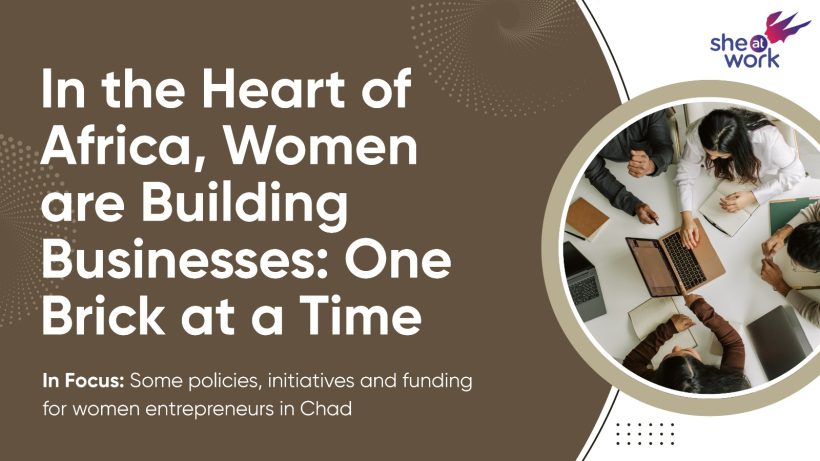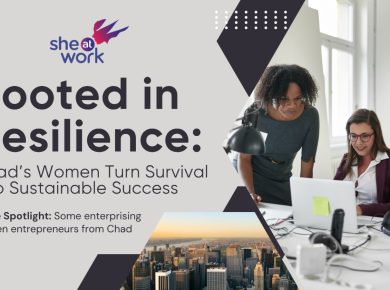In Focus: Some policies, initiatives & funding for women entrepreneurs in Chad
#ChadWomenRise #SheBuildsChad #AfricanWomenEntrepreneurs #FromMicroToMighty #SahelStartupSisters
Let’s talk about Chad, which is a landlocked country often called the “Dead Heart of Africa”, but don’t be fooled by the nickname. Beneath its arid landscape & economic challenges lies a pulse of untapped potential, especially among its women entrepreneurs.
Yes, it’s true: Chad’s entrepreneurial journey is still in its early chapters. The country battles many serious hurdles like – limited infrastructure, high taxes, widespread corruption & a struggling financial system that makes even opening a small business feel like climbing a sand dune. And for women? The slope is even steeper.
But here’s where things get interesting.
Despite the odds, women in Chad are quietly running micro-enterprises, selling produce, managing small shops & making a difference in their communities – one step, one sale at a time. Microfinance has become a lifeline, helping women-led Very Small Enterprises (VSEs) survive, where traditional banks fail. With agriculture making up over half the country’s GDP, there’s real opportunity in crops like sesame, guava, and millet, and women are inching their way into this space, hungry to grow.
What’s missing? Training, funding, support & belief.
From Survival to Startups: Unlocking Chad’s Female Business Potential
There’s a growing movement to shift from survival to sustainability. With the right resources – accessible micro-loans, skills development, mentorship & less red tape – Chadian women could go from local shopkeepers to national change-makers.
Now, we’ll explore the resources slowly shaping a better future for women entrepreneurs in Chad. Because behind every challenge lies a woman ready to rise –
if only the world meets her halfway.
- A Vision for Development in 2030
“Vision 2030, the Chad We Want” reflects the will and decision of the Republic of Chad’s High Authorities – to meet the legitimate aspirations of the Chad people. It reflects the Government’s will and commitment to long-term development.
This is therefore a matter of stimulating the country’s development process, targeting development by 2030 through three National Development Plans (NDP 2017-2021, NDP 2022-2026 and NDP 2027-2030). These plans are to be implemented – to accelerate structural transformation in society, governance and the rule of law, the economy and the environment.
The Vision’s main objective is to make Chad an emerging country by 2030.
Specifically, this implies:
i) strengthening the foundations of good governance and the rule of law while improving national cohesion, and
(ii) creating the conditions for sustainable development.
To meet these goals, four strategic axes have been identified.
– Strengthening National Unity
– Strengthening Good Governance and the Rule of Law
– Developing a Diversified and Competitive Economy
– Improving the Quality of Life of the Chad People
Given the challenges to be faced and risks to be mitigated, various strategies are being implemented in order to achieve Vision 2030 – to highlight Chad as a peaceful nation, unified in its cultural diversity, resilient by its transformed economy, which is offering a pleasant living environment.
https://www.lse.ac.uk/GranthamInstitute/wp-content/uploads/2019/07/8879.pdf
- Chad’s 30 billion FCFA Youth Entrepreneurship Fund
The Chadian Ministry of Finance and Budget proceeded on June 11 – to the official launch of the “Youth Entrepreneurship Fund” and to the signing of a partnership agreement with local banks. The Head of State when addressing the nation on April 14, had announced a $ 30 billion fund – to support youth entrepreneurship.
The government and local banks have agreed on loan mechanisms for young Chadian entrepreneurs. Young project leaders will now be able to benefit from more flexibility & access to finance from the banks.
According to the Minister of Finance and Budget, to be eligible, youth projects must comply with the provisions of the law establishing the Youth Entrepreneurship Fund. The projects will be 100% funded by banks with a state guarantee of around 70%.
Regarding the resources of the fund, these will come mainly from State subsidies, from the allocation of part of the resources of organizations, agencies and other funds for young people such as ONAPE, ONAJES etc.
To promote solidarity between genders & territories, with a view to decentralizing economic activities, a fraction of the loan will be granted to young people in the provinces and 30% of loans will be granted to young women & girls.
https://cemac-eco.finance/chads-30-billion-fcfa-youth-entrepreneurship-fund-operational
- For Development of Youth & Women Entrepreneurship
With banking services almost non-existent outside urban areas, only 7% of Chadians have access to financial services and resort to the informal system or loan sharks. Despite the implementation of the Government of Chad’s National Financial Inclusion Strategy (201-2024), most of the 115 registered microfinance institutions (MFIs) continue to face great difficulties in meeting the needs or marginalised groups, particularly small businesses, as their activities are limited by lack of infrastructure, capacity and reliable technological solutions.
The African Development Bank, through the Africa Digital Financial Inclusion Facility (ADFI), have awarded a grant agreement for $650,000 with the Government of Chad to promote economic empowerment of women and youth through innovative digital financial and non-financial services.
This initiative contributes to the Microfinance Development Support Project for Women and Youth Entrepreneurship led by the Agriculture, Human, and Social Development Complex (AHHD). This initiative is financed by the Africa Digital Financial Inclusion Facility (ADFI) together with co-funding of $12.8 million from the African Development Bank’s Transition Facility Fund and of $650,000 from the Bank’s Affirmative Finance Action for Women in Africa (AFAWA).
The overall aim is to provide systemic support to the microfinance sector and the entrepreneurial ecosystem – by facilitating access of vulnerable groups to innovative and secured financial and non-financial services, through digital transformation & to promote women’s economic empowerment and youth entrepreneurship in the country’s rural areas.
The project will be implemented over five years – (The time period is 09.06.2025 – 31.05. 2028).
It has three components:
- to improve the supply of microfinance services and develop digital finance
- improve the demand for financial services
- strengthen the entrepreneurial ecosystem in rural areas, as well as project coordination and management
The funding support from the Africa Digital Financial Inclusion facility (ADFI), together with technical assistance from ADFI and oversight from AHHD and AFAWA – aims to support increased financial inclusion and job creation opportunities by not only building the capacity of microfinance institutions to develop new digital financial services for excluded women and youth, but also through the first FinScope study to assess the supply and demand of financial services in Chad.
- Africa Woman Innovation & Entrepreneurship Forum (AWIEF)
AWIEF is a not-for-profit economic empowerment organization for all African women and girls. They are a Pan-African business networking, information and equal opportunity platform for women business owners and entrepreneurs, innovators & social enterprises.
AWIEF advocates women’s equality and empowerment as drivers of development and strives. The purpose is to foster enhanced economic participation and opportunities for women – to fast-track Africa’s transformation and inclusive sustainable growth.
AWIEF connects emerging with established women entrepreneurs and works to equip young and next generation women entrepreneurs – with the tools to succeed. They provide valuable business capacity development and skills support programmes, resources & connections. They facilitate and support Africa women-owned and women-led business start-ups, high growth and scale-ups.
Plus the Annual AWIEF Conference and Exhibition is an international platform used to debate and discuss issues negatively impacting the economic empowerment and economic security of all African women and girls. In fact, participating at the AWIEF Conference, each year, it is indeed a rich experience. Besides learning, meeting exemplary individuals and organizations, growing your network, promoting your business you also get inspired, motivated and empowered by outstanding and leading African women entrepreneurs, as they share their stories, experiences and perspectives.
- International Trade Centre’s (ITC) ACCESS!
Women entrepreneurs across Africa are generating employment and adding value to exports in innovative ways. But, here’s a reality check. They still face a host of challenges, such as limited access to export training, market information and finance, in addition to other blockages women face in the business environment.
Since 2007, the International Trade Centre’s (ITC) ACCESS! Export Training Programme has been dedicated to addressing these limitations by strengthening the competitiveness of women exporters. It does this through a network of more than 60 certified national trainers, four certified lead trainers and a comprehensive training package of 32 modules, available in both French and English. Moreover, ACCESS! works to build the capacity of trade support institutions such as – trade ministries, chambers of commerce and women’s business associations to support them.
Today, ACCESS! has grown to be a recognized programme in Africa, helping women exporters in 20 different countries to reach their full economic potential and thereby contributing to long-term poverty reduction and improved standards of living. In fact, there are available case studies that highlight women entrepreneurs in Africa, who have benefitted from the support of ACCESS! They elaborate on how these women have successfully managed their businesses in the face of considerable challenges and how ACCESS! has helped give them a competitive edge in world markets.
https://www.intracen.org/news-and-events/news/supporting-women-in-africa
- The Girls’ Education and Women’s Literacy Project
The Board of Directors of the African Development Bank approved a grant of $11.26 million to the Government of Chad to finance the Girls’ Education and Women’s Literacy Project – the first Bank grant exclusively targeting women and girls.
The project will be financed from the Bank’s Transition Support Facility and will be implemented over a five-year period by the Chadian Ministry of National Education and Civic Promotion, in coordination with partners involved in the education sector, civil society organizations, and youth organizations. The Chadian government will contribute a non-monetary contribution of $713,000 towards the programme.
Through this financing, the African Development Bank is providing support to the Chadian government to reduce inequalities through access to education – especially for girls. This enables the development of job skills and the improvement of women’s productivity potential through literacy, job training and the development of income-generating activities.
The Girls’ Education and Women’s Literacy Project is integrated into the Government of Chad’s Interim Education Plan which is working to upgrade the nation’s education system and strengthen human capital – education, health and well-being of children and youth today who will become Chad’s working population of tomorrow.
The Girls’ Education and Women’s Literacy Project (PEFAF) – aims to promote equality and equity in access and quality of education for girls and functional literacy for women in Chad.
Overall, the project will
(i) increase access for girls’ enrolment in middle, general secondary school or vocational training;
(ii) provide functional literacy programmes for women with a focus on learning a trade linked to income-generating activities; and
(iii) improve the quality of education and training for girls and women.
https://mapafrica.afdb.org/en/projects/46002-P-TD-IAE-002
- EU & Chad Partnership
With a population of over 19 million, Chad is a ‘landlocked’ country in Central Africa.
Sharing a long-standing partnership for over 60 years, EU and Chad are focused on promoting stability through socio-economic development. This cooperation in Chad, as part of the Global Gateway strategy, supports the development of the Ndjamena-Douala strategic corridor, structural investments (transport, rural electrification, value chains) and strengthening human capital (vocational training) – to promote agri-food entrepreneurship adapted to climate change and offer better prospects for young people in Chad, particularly young girls and women.
Team Europe in Chad includes – the EU, the European Investment Bank, France, Germany, Italy & the Netherlands, and Spain.
The EU allocated €280 million to the partnership for 2021-2024. Chad also benefits from regional and multi-country EU development programmes.
Together with Chad the EU works to improve the quality of education, foster vocational training opportunities, promote academic mobility & cultural exchange.
https://international-partnerships.ec.europa.eu/countries/chad_en
- Economic Community of Central African States (ECCAS)
ECCAS is an Economic Community of the African Union – for the promotion of regional economic co-operation in Central Africa. Its primary objective is – to achieve collective autonomy, maintain economic stability via harmonious cooperation and raise the standards of living of its populations.
It has not been easy for ECCAS to meet these objectives, especially with growing poverty in member countries like Chad, Equatorial Guinea, Central African Republic, the Democratic Republic of Congo and Cameroon. Women in these countries happen to be those mostly affected by poverty which hinders their ability to participate and profit from business initiatives in the zone.
The taxation system in the ECCAS zone can be said to be prohibitive. Entrepreneurs, especially female entrepreneurs, still suffer from excessive taxes. According to the World Bank’s Doing Business report of 2010, in Cameroon citizens have to part with 121% of their gross national income in order to begin a business. In Chad and Central Africa Republic respectively, citizens have to part with 176.1% and 244 % of their gross national income in order to begin a business. This scenario is also true with oil-rich Equatorial Guinea which charges 100.4% from ordinary citizens who wish to start a business. The picture for after profit tax is equally depressing; 60.1% for Chad, 59.5% for Equatorial Guinea, 203.5% for Central African Republic, 322% for the Democratic Republic of Congo and 50.5% for Cameroon. According to the 2012 Doing Business report of the World Bank, much has not changed.
The 2012 World Bank’s Doing Business report ranks Chad 183rd out of 183 countries, making Chad the most difficult place to do business in the world. Equatorial Guinea is ranked 155th, Gabon is ranked 156th, Cameroon is ranked 161th, Central African Republic is ranked 182nd, the Democratic Republic of Congo is ranked 178th.
However, ECCAS plans to live up to its mission; to create a good economic, social, political as well as a legal environment for her citizens. In May 2010, national leaders of ECCAS met in a bid to help clean the books of the Bank of Central African States (BEAC), which had been inundated by serious corruption. The managerial modus operandi of the bank was restructured, to tackle most especially corruption.
Considering the fact that female entrepreneurs remain underprivileged when it comes to having access to loans to start businesses, it is necessary that financial institutions, including micro economic institutions, furnish women with loans to start off businesses in the ECCAS zone. Women in the ECCAS zone do have business potential, which remain underexploited.
A major reason why most female entrepreneurs are not encouraged to do business in the ECCAS zone – is because of the exorbitant taxes. And, curbing exorbitant taxes can also spur women entrepreneurs to start up business in the ECCAS zone.










